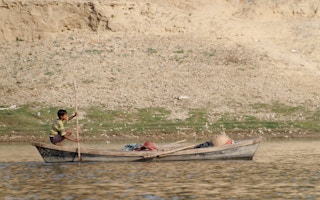Countries around the Ganges-Brahmaputra-Meghna (GBM) basin lose over US$14.2 billion annually from lack of cooperation in sharing the waters of these rivers, with little prospect of accord in the foreseeable future, according to new analysis.
“A lack of collaborative arrangements and unilateral exploitation of the basin’s freshwater resources have made transboundary water management a contested issue, catalysing disputes and leading to regular conflicts,” says the study led by Ashok Swain, head of the Department of Peace and Conflict Research and the director of Research School of International Water Cooperation at Sweden’s Uppsala University.
The report suggests that “considering China’s apathy to any involvement in any basin-wide multilateral cooperation”, the South Asian countries, including Bangladesh, Bhutan, India and Nepal, could form a common river management framework on the lines of the Mekong River Commission.
Swain, who is also the UNESCO Chair on International Water Cooperation, tells SciDev.Net that countries in the basin will eventually realise that sub-basin cooperation is the only option.
“
We need to change the status quo and begin a new era of meaningful multilateral cooperation for the best possible use of their shared water resources.
Ashok Swain, director, Uppsala University Research School of International Water Cooperation
The study, commissioned by the Trans-boundary Rivers of South Asia (TROSA) programme, says that while the demand for water is increasing, its availability and quality are gradually decreasing, fuelling competition among the riparian states (countries bordering a transboundary inland river or lake).
“One promising strategy to promote benefit-sharing is the joint development of multipurpose storage dams in the upper catchment of the GBM basin,” the study says. “That will allow the riparian states to store excess water during the monsoon, regulate floods during the peak time, and increase river flow in the dry period.
Analysing the economic costs of non-cooperation across the water, energy, food and environment sectors, the researchers identified major adverse effects such as deteriorating water quality and availability, reduced agricultural productivity and fisheries, degradation of ecosystems, untapped hydropower potential and greater loss of lives and livelihoods due to natural disasters.
Between 1976 and 1993, lack of adequate cooperative arrangements in the Ganges basin between Bangladesh and India cost Bangladesh annual financial losses of about US$186.59 million, which was around 0.6 per cent of the country’s GDP at that time.
Similarly, due to non-cooperation, Nepal and Bhutan lose annual economic benefits of between US$105 million and US$1.8 billion under different scenarios from the development of hydropower generation projects.
“Such a high cost of non-cooperation in one of the most climate-stressed regions warrants for more urgent action by various stakeholders to improve and sustain cooperation on shared waters and associated natural resources,” the study says.
“In the GBM basin, any political party of any country that proposes that more water should be allocated to the neighbouring country will be booted out of power promptly,” Asit Biswas, director of the Singapore-based consultancy firm Water Management International and a visiting professor at the University of Glasgow, UK, tells SciDev.Net.
Biswas notes that even for two countries like India and Bangladesh, which enjoy good relations, there have been disagreements on water-sharing from the time Bangladesh was created in 1971.
As for countries like India and China that are not only serious geopolitical rivals but have had long-standing border disputes, it is naive to consider that they will cooperate in any way on water for the next 30-50 years, says Biswas.
He believes Bangladesh, India and Nepal can improve their own water management practices to gain billions of dollars, regardless of what happens in its upstream countries.
“My advice to all the countries of the GBM basin is to first improve their national water management practices, which can be done now and under the exclusive control of each national government, rather than wait for real cooperation in the GBM basin, which is highly unlikely to occur for at least the next 30 to 40 years,” he says.
Scott Moore, a political scientist at the University of Pennsylvania who specialises in environmental sustainability, technology, and international relations, tells SciDev.Net that there were several factors that make cooperation difficult in the GBM basin. “These include geopolitical tensions, sectarian and identitarian divides, underdeveloped institutional capacity, and a lack of shared infrastructure.”
Moore says that the estimate quoted by the study of US$14 billion “does not sound completely unreasonable, though it should be treated as entirely indicative”.
For the sake of the region’s future progress it is important “to change the status quo and begin a new era of meaningful multilateral cooperation for the best possible use of their shared water resources,” Swain says, adding that even “maintaining the status quo will make the existing vulnerabilities more complex”.
This article was originally published on SciDev.Net. Read the original article.










